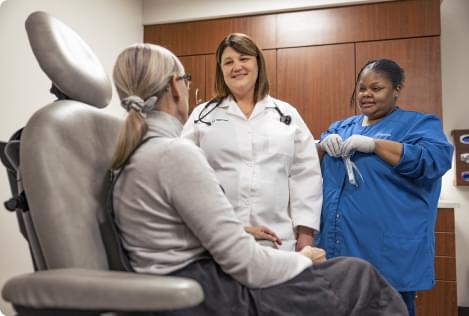| Study Name | Description | Trial Category | Trial SubCategory Sort ascending |
|---|---|---|---|
| AALL1231 | A Phase lll Randomized Trial Investigating Bortezomib (NSC#681239; IND# 58443) on a Modified Augmented BFM (ABFM) Backbone in Newly Diagnosed T-Lymphoblastic Leukemia (T-ALL) and T-Lymphoblastic Lymphoma (T-LLy) | Childhood Cancers | Leukemia |
| COG-AHEP0731 | Treatment of Children with All Stages of Hepatoblastoma | Childhood Cancers | Blastoma |
| COG-ANBL00B1 | Neuroblastoma Biology Studies | Childhood Cancers | Blastoma |
| COG-ACNS0332 | Efficacy of Carboplatin Administered Concomitantly with Radiation and Isotretinoin as a Pro-Apoptotic Agent in Other than Average Risk Medulloblastoma/PNET Patients | Childhood Cancers | Blastoma |
| ANBL1232 | Utilizing Response-and Biology-Based Risk Factors to Guide Therapy in Patients with Non-High Risk Neuroblastoma | Childhood Cancers | Blastoma |
| Acoustic Diagnosis of Gastroesophageal Reflux Disease | Baby/Child | Reflux Disease | |
| COG: ARST1321 | Pazopanib Neoadjuvant triao in Non-Rhabdomyosarcoma soft tissue sarcomas(PAZNTIS): A phase II/III randomized trial preoperative chemoradiation or preop radiation plus or minus Pazopanib | Childhood Cancers | Sarcoma |
| COG-AEWS07B1 | A Children's Oncology Group Protocol for Collecting and Banking Ewing Sarcoma Specimens | Childhood Cancers | Sarcoma |
| NRG-GU009 | The purpose of this study is to determine if it is effective to use your genomic risk to determine the level of treatment you need. Those with a lower genomic risk get a de-intensified treatment and those with a higher risk get a intensified treatment. You must be diagnosed with high-risk prostate cancer. | Cancer | Prostate |
| NRG-GU010 | The purpose of this study is to determine if it is effective to use your genomic risk to determine the level of treatment you need. Those with a lower genomic risk get a de-intensified treatment and those with a higher risk get a intensified treatment. You must be diagnosed with unfavorable intermediate risk prostate cancer. | Cancer | Prostate |
| EAA181 | The purpose of this study is to determine what consolidation regimen is most effective. Patients cannot get stem cell transplant until first relapse or later. You must have newly diagnosed multiple myeloma (MM). | Cancer | Multiple Myeloma |
| S2209 | This study is for frail-intermediately fit newly diagnosed multiple myeloma patients. Your current lab values will be used to determine if you qualify for this study. This study compares different chemo regimens to determine the effectiveness of them. | Cancer | Multiple Myeloma |
| S1803 | The purpose of this study is to compare daratumumab and lenalidomide vs lenalidomide alone for maintenance therapy after stem cell transplant. You must be diagnosed with multiple myeloma. | Cancer | Multiple Myeloma |
| S2101 | This study is for patients with Stage III or IV, unresectable, recurrent, or metastatic melanoma. This study uses Nivolumab and Cabozantinib to treat patients. | Cancer | Melanoma |
| EA6141 | The purpose of this study is to compare the effectiveness of Nivolumab, Ipilimumab and Sargramostim vs Nivolumab and Ipilmumab. You must be diagnosed with unresectable stage 3 or stage 4 melanoma. | Cancer | Melanoma |
| EA3132 | This study is comparing radiation therapy with and without Cisplatin. You must have surgically resected squamous cell carcinoma of the head and neck stage 3 or 4. | Cancer | Head and Neck |
| A031803 | The purpose of this study is to determine the effectiveness of intravesical gemcitabine in combination with prembrolizumab. Patients must have been diagnosed with invasive bladder and already received chemo. | Cancer | Bladder |
| A031701 | The purpose of this study is to compare standard or dose dense gemcitabine and cisplatin chemo. You must have been diagnosed with muscle invasive bladder cancer. | Cancer | Bladder |
| S1806 | The purpose to this study is to look at the effectiveness of adding atezolizumab to chemo and radiation. You must be diagnosed with muscle invasive bladder cancer. You cannot have already received chemo or radiation. | Cancer | Bladder |
| Agendia FLEX | The purpose of this study is to create a large population based database to identify new gene associations in breast cancer. You must be diagnosed with stage 1, 2 or 3 breast cancer. A report is created that looks at the risk of your cancer spreading over the next 10 years. | Cancer | Breast |
| S1706 | This study is looking at using Olaparib after a masectomy at the same time as radiation vs getting radiation alone to determine if adding the medication provides better results. | Cancer | Breast |
| S2212 | The purpose of this study is to compare anthracycline-free, taxane-platinum chemo with pembrolizumab to taxane-platinum-anthracycline chemo with pembrolizumab. This study is for people diagnosed with triple negative breast cancer. | Cancer | Breast |
| ISPY 2 | This study uses the type of breast cancer you are diagnosed with to determine what treatment you are given. You must be diagnosed with stage 2 or stage 3 breast cancer. This study requires regular MRI's. | Cancer | Breast |
| NRG-BR009 | The purpose of this study is treat breast cancer after surgery. You must have estrogen positive breast cancer and an oncotype score ≤25. This study looks at adding chemotherapy to the standard treatment of ovarian function suppression and aromatase inhibitor. | Cancer | Breast |
| NSABP FB-12 | This is a study for patients diagnosed with Her2 negative breast cancer. It is looking at the effectiveness and safety of doxorubicin plus cyclophosphamide followed by weekly paclitaxel plus trastuzumab and pertuzumab before surgery. | Cancer | Breast |
Unsupported Browser! This website will offer limited functionality in this browser. We only support the recent versions of major browsers like Chrome, Firefox, Safari, and Edge.


